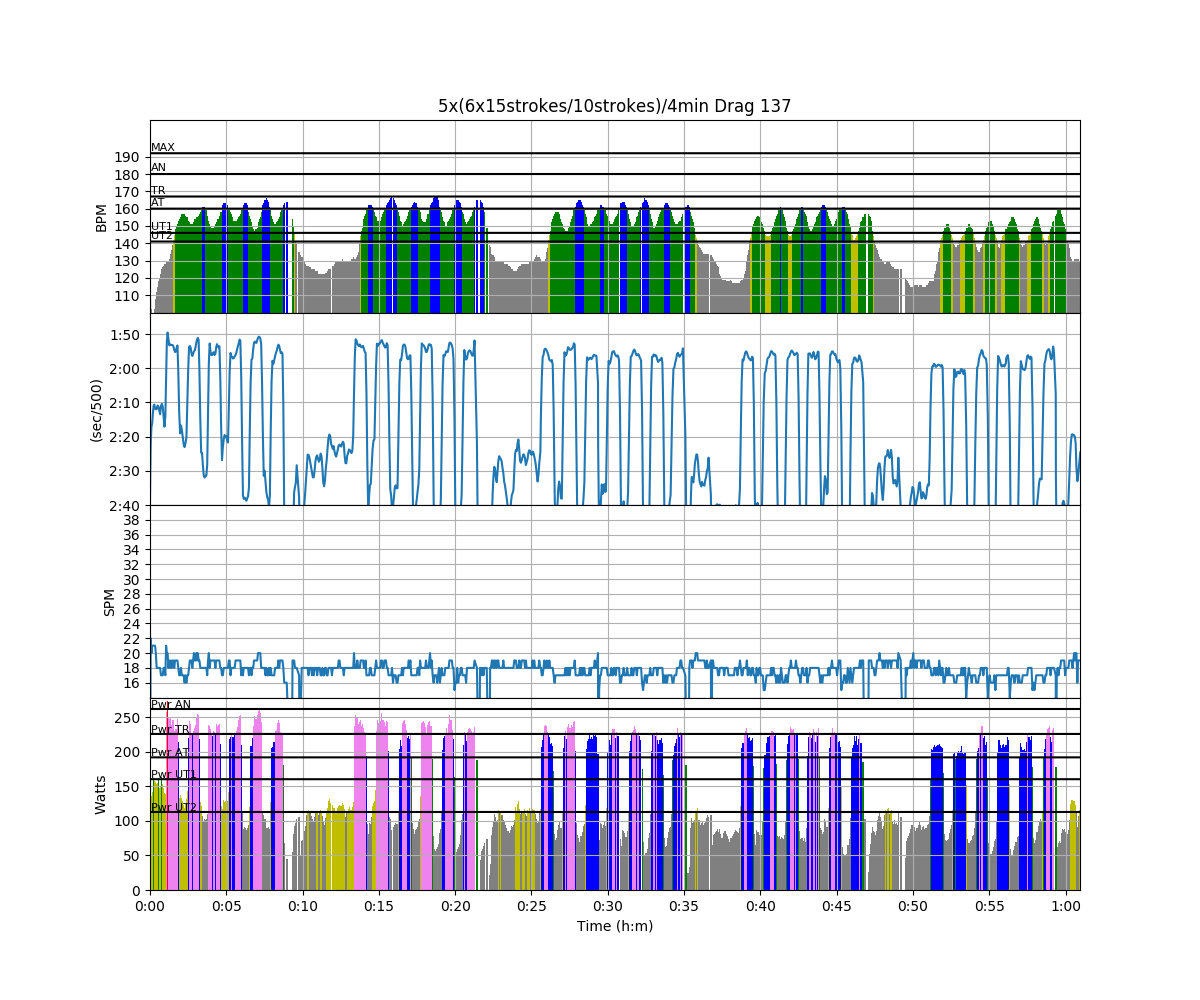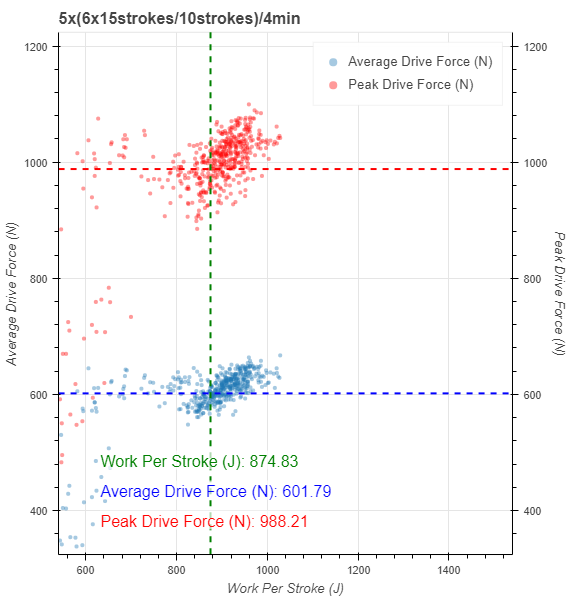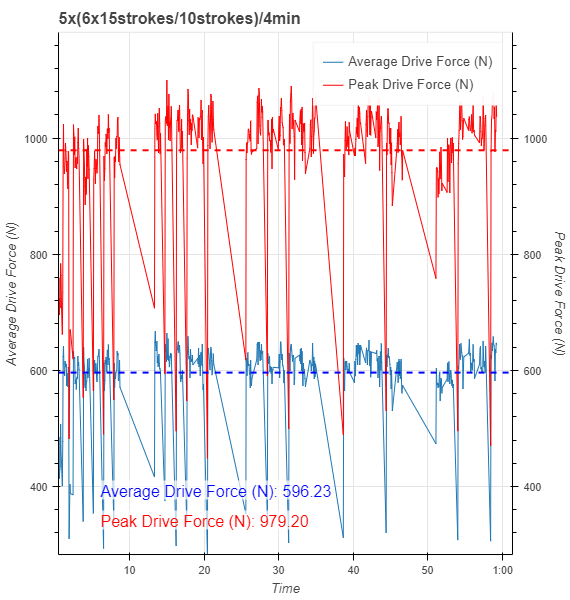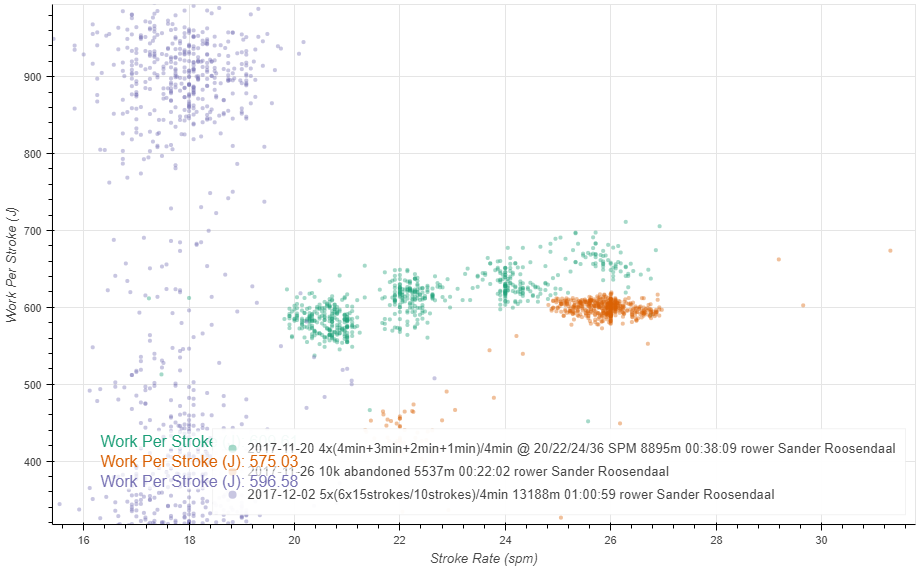Strength or rowing training?
It has been snowing and below zero for most of the week, so I didn’t even bother going to the rowing club. I would have difficulty finding a free erg.
Instead, I took some time after breakfast to plan out my December training mesocycle. I also reviewed our club Masters rowers training plan for the past week and looked at what I have done during the trip to Belgrade, and what I had planned for this week, and tried to find the two missing trainings, for Saturday and Sunday.
I did this, because on Sunday I will be training with the Masters group, so I want to do the same training they do. That turned out to be a 5x5min at fairly high intensities.
So, for Saturday, I had the choice between steady state and something that looked … interesting. I know I don’t get enough strength training and I am a skinny aerobic freak. Perhaps this was worth a try:
5x(6×15 strokes / 10 strokes)/4min at 17spm at 140 drag
So what is that? You do bouts of 15 strokes at max force, with 10 strokes of light paddling. You do this 6 times, then paddle for 4 minutes, and repeat until you have done a total of 5 sets.
If I liked, I might start doing more of these.
I tried the Painsled Beta again during the warming up. I wasn’t able to connect to Zwift because Zwift insisted on installing a 16 minute update download, and I didn’t want to wait for it. I also struggled with the app crashing on CSV data export, but managed to get out my data eventually.
But for the main event, I switched the iPhone for the iPad (with the regular Painsled), because I didn’t want to risk losing data. Here they are:

I found it difficult to count the sets of 15 and remember where I was. If you look carefully, there is one set of 7 intervals. Well, I am glad I didn’t discover a set of 5. Each set turned out to last about 12 to 13 minutes, so it was easy to calculate if I was doing set 4 or set 5.
This was interesting. I found it difficult to hold 17spm and found myself driving to 18spm, even 19spm sometimes.
I was going somewhere between 1:54 and 1:57 pace. As the PM averages over three strokes, it was hard to estimate the exact power. I also think that Work per Stroke is the correct metric to use in this workout. There should be a Work per Stroke display on the PM. But perhaps it doesn’t matter much, as long as you are giving it the maximum per stroke.
I did have to watch posture though. I think this is a risky workout for my back, so I did monitor myself to sit straight and push on the legs only in the first half of the stroke.
Here’s a chart of Work per Stroke, Average Drive Force and Max Drive Force:

I have filtered out all the rest paddling in this chart, but still there is quite a large spread on the horizontal axis. Here is how the peak and average force behaved over time:

I also made this beautiful chart, trying to see if the differences in work per stroke were due mostly to differences in drive length or differences in average force. Looks like a mix of both. Drive length is closer to my usual range of values, though. I conclude that this was a rowing specific strength training.

Greg, here is the chart you requested:

Follow me in social media
Like this:
Like Loading...
Dec 3 2017
Rowing training or strength training?
Strength or rowing training?
It has been snowing and below zero for most of the week, so I didn’t even bother going to the rowing club. I would have difficulty finding a free erg.
Instead, I took some time after breakfast to plan out my December training mesocycle. I also reviewed our club Masters rowers training plan for the past week and looked at what I have done during the trip to Belgrade, and what I had planned for this week, and tried to find the two missing trainings, for Saturday and Sunday.
I did this, because on Sunday I will be training with the Masters group, so I want to do the same training they do. That turned out to be a 5x5min at fairly high intensities.
So, for Saturday, I had the choice between steady state and something that looked … interesting. I know I don’t get enough strength training and I am a skinny aerobic freak. Perhaps this was worth a try:
5x(6×15 strokes / 10 strokes)/4min at 17spm at 140 drag
So what is that? You do bouts of 15 strokes at max force, with 10 strokes of light paddling. You do this 6 times, then paddle for 4 minutes, and repeat until you have done a total of 5 sets.
If I liked, I might start doing more of these.
I tried the Painsled Beta again during the warming up. I wasn’t able to connect to Zwift because Zwift insisted on installing a 16 minute update download, and I didn’t want to wait for it. I also struggled with the app crashing on CSV data export, but managed to get out my data eventually.
But for the main event, I switched the iPhone for the iPad (with the regular Painsled), because I didn’t want to risk losing data. Here they are:
I found it difficult to count the sets of 15 and remember where I was. If you look carefully, there is one set of 7 intervals. Well, I am glad I didn’t discover a set of 5. Each set turned out to last about 12 to 13 minutes, so it was easy to calculate if I was doing set 4 or set 5.
This was interesting. I found it difficult to hold 17spm and found myself driving to 18spm, even 19spm sometimes.
I was going somewhere between 1:54 and 1:57 pace. As the PM averages over three strokes, it was hard to estimate the exact power. I also think that Work per Stroke is the correct metric to use in this workout. There should be a Work per Stroke display on the PM. But perhaps it doesn’t matter much, as long as you are giving it the maximum per stroke.
I did have to watch posture though. I think this is a risky workout for my back, so I did monitor myself to sit straight and push on the legs only in the first half of the stroke.
Here’s a chart of Work per Stroke, Average Drive Force and Max Drive Force:
I have filtered out all the rest paddling in this chart, but still there is quite a large spread on the horizontal axis. Here is how the peak and average force behaved over time:
I also made this beautiful chart, trying to see if the differences in work per stroke were due mostly to differences in drive length or differences in average force. Looks like a mix of both. Drive length is closer to my usual range of values, though. I conclude that this was a rowing specific strength training.
Greg, here is the chart you requested:

Follow me in social mediaShare this:
Like this:
By sanderroosendaal • Uncategorized • 0 • Tags: concept2, ergometer, OTE, rate restricted, rowing, training